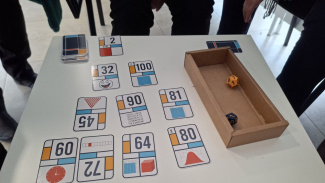Workshop on Quantum Science and Technology in Sofia
The workshop Quantum Science and Technology in STEM Education was held successfully in Sofia, Bulgaria on October 11, 2025. The training was created for teachers of natural sciences, mathematics, computer science, and other related disciplines who work mainly with middle and high school students. In total, 17 teachers from different schools, cities, and backgrounds took part in the event, making the group diverse and very dynamic.
The program lasted four hours and gave the participants the chance to discover new approaches for teaching quantum science in their classrooms. The first part of the workshop was led by Mariana Filipova. She introduced the teachers to the importance of quantum technologies for the future and presented visual materials from Science on Stage. A highlight of this session was the STEM theatrical experiment with chocolate balls, based on Karl Svozil’s model, which explained the basics of quantum cryptography in a playful and easy-to-understand way. Storytelling was used as a creative method for teaching quantum concepts, and the teachers also explored how popular AI tools can support STEM lessons. The session ended with a specially designed Kahoot quiz, which showed how learning through play can motivate students.
The second part was facilitated by Mariela Stancheva, who introduced the RSA algorithm, asymmetric cryptography, and public key encryption. She also presented the educational board game The World of Byte, connecting mathematics and logical strategies with quantum-related topics in an accessible way Another interactive element was the board game Cat in the Box, where participants experienced quantum concepts in practice through play.
The training created an inspiring environment where complex scientific topics became simple, creative, and enjoyable. At the end, many teachers shared that they plan to use the games, storytelling methods, and digital tools immediately in their classrooms. They expressed that these approaches will help them make science lessons more engaging, motivating, and easier to understand for their students.
The workshop proved that quantum science and technology can be integrated into STEM education in ways that are interactive, inclusive, and practical. Participants left with new knowledge, teaching strategies, and tools they can apply directly in their schools, helping students to discover science with curiosity and confidence
Report: Mariana Filipova

Share this page